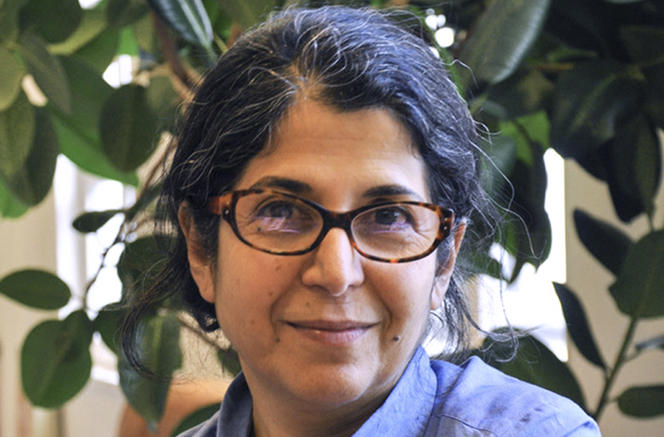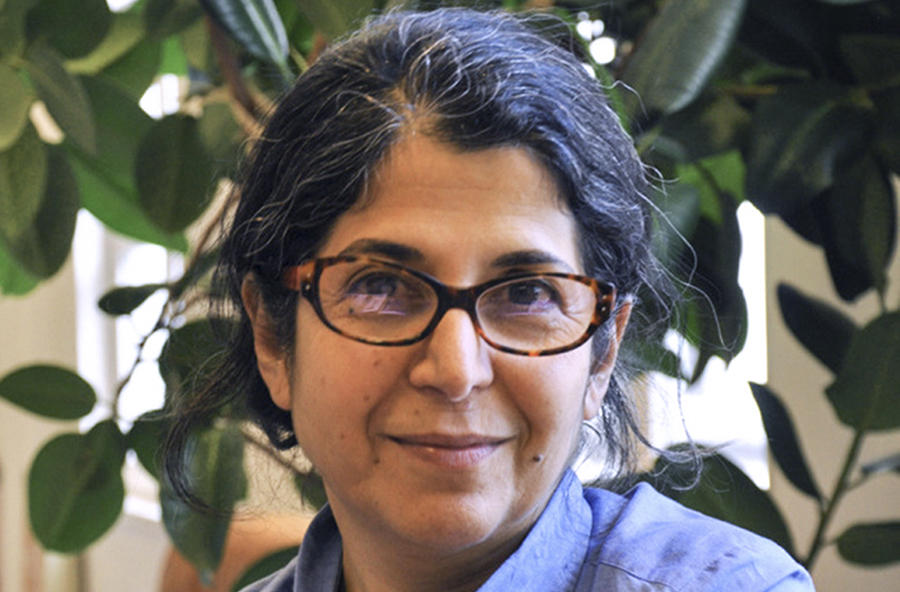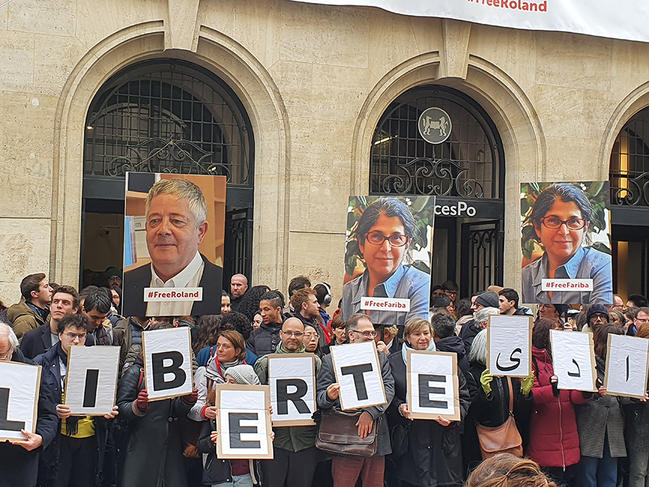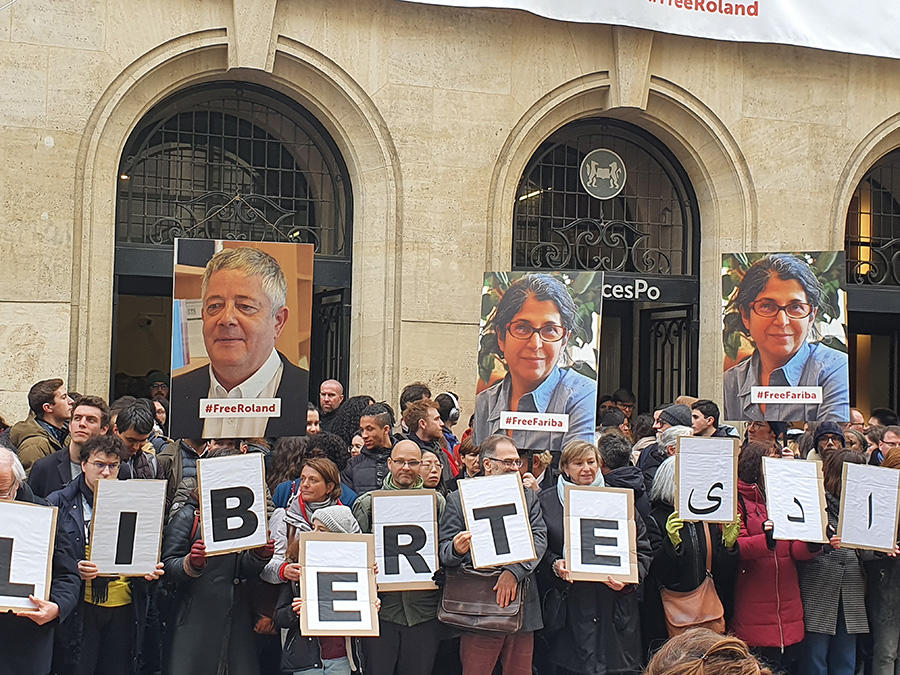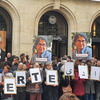You are here
Roland Marchal: “I was an academic hostage”
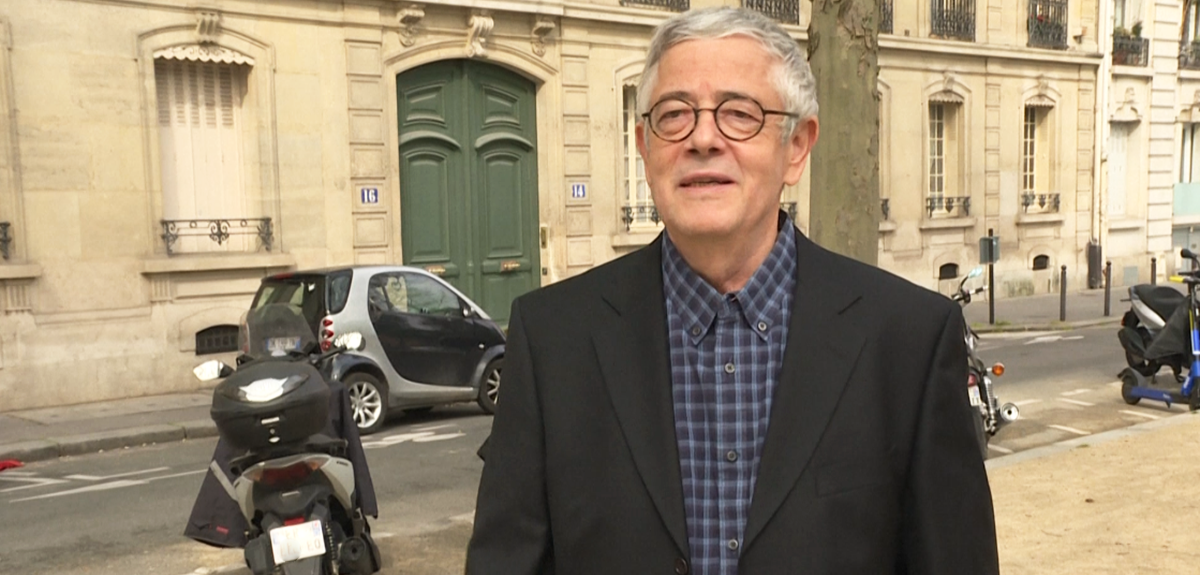
Roland Marchal’s nightmare came to an end on 20 March of this year. After being held prisoner in Iran for nine and a half months, this specialist in the Sahel, known for his studies of the civil wars that have ravaged the Horn of Africa, was able to return to France at last. His ordeal began on 6 June, 2019, when he travelled to Iran to see his partner, the Franco-Iranian researcher Fariba Adelkhah. Marchal was arrested at Tehran airport and incarcerated in the high-security wing of Evin Prison. He did not know it yet, but a few hours earlier Adelkhah had also been arrested. Accused of espionage, the 63-year-old researcher would only find out months later that he was actually being held as a bargaining chip – an “academic hostage”, as he puts it.
Fariba Adelkhah, still in custody in Iran, received notice of her sentence on Saturday 16 May. Have you heard anything from her? What is her current situation?
Roland Marchal: I have some news through her family, with whom she is in regular contact. Fariba’s trial was finally held last 18 April. The judge had two weeks to hand down a decision, but he submitted it directly to the judicial council of the revolutionary courts to get their opinion, which explains why she didn’t hear the verdict until now. She was given the maximum sentence, six years in prison, for “collusion” against national security and “propaganda against the system”. We had been bracing ourselves for such an outcome: first-instance cases involving national security usually result in a maximum penalty. Then in appeal, theoretically, the judge looks at the merits of the accusations and the arguments for the defence, and might decide to reduce more or less substantially the duration of the sentence. The current crisis due to the coronavirus and the question of Iran’s loan request to the IMF are significantly changing the political situation, which could work in her favour.
One thing is certain: Fariba wants her release to be unconditional. She wants to come out holding her head high, with her computer and her field notes. She doesn’t want her release to be subject to restrictions on her freedom of expression in Iran. She wants to continue doing her research there without conceding to any kind of blackmail, such as “We’ll let you go if you don’t say anything and abandon your work”. It’s a question of principle for her as an Iranian who has already spoken out publicly in past cases of other academics who have been arrested.
What was the purpose of your trip to Iran in June 2019?
R.M.: I’m a specialist in armed conflicts, especially in Sudan, Somalia and the Central African Republic, and I’ve spent a lot of time in those countries. It might seem difficult to imagine from a Parisian point of view, but I was going on holiday to Iran, where Fariba, who is also a fellow researcher at the Sciences Po Centre for International Studies (CERI),1 had received funding for an important research project. I work in countries that are not exactly seen as tourist destinations. There are nicer places for a romantic stroll than Bangui or a beach in Mogadishu. Iran has an incredible historic heritage and its society has opened up considerably in the past 20 years. Honestly, the only thing that Fariba and I talked about just before we were arrested was which city to visit during my stay, which was supposed to last six days.
What were the Iranian authorities’ accusations against you?
R.M.: I was arrested when I got off the plane, interrogated at the airport, and then taken the next day to Evin Prison in Tehran, where they put me in solitary confinement in the high-security wing controlled by the Pasdaran Revolutionary Guard. My computer, iPad and telephone were confiscated and all of my emails and files were searched. During the first two months, I was submitted to a lot of questioning, whose goal was to trace my life and career and to prove who I actually was, according to my jailers: an expert on Iran. For the Pasdaran, my work in Africa had to be a pretext.
At first they accused me of being the head of a major French spy network in Iran, but then the story changed. At one point I was supposedly trying to influence Iran’s foreign policy – I had in fact invited an Iranian researcher to a public conference on the Red Sea held at Sciences Po in March 2019. Another time I allegedly worked for the United Nation committee in charge of overseeing sanctions against Iran, even though I didn’t even know that such a thing existed! All of this was based on an email message from a friend telling me that representatives of the committee would be in the Central African Republic when I arrived there. Finally I became a CIA agent because I knew some American diplomats – I work in African countries where the United States has a strong presence – and because I had been invited to participate in conferences organised by the US Department of State through one of its offices now called the Bureau of Research and Intelligence, which is mainly an interface with the academic world, the equivalent of the Centre d’Analyse et de Prévisions at the French Ministry of Foreign Affairs.
They had nothing to charge me with and were looking for something they could use. It’s a common Pasdaran method that I’ve seen applied to many other detainees: first they arrest you, they hold you in solitary confinement, and then they start to think about the investigation file, so they interrogate you to find some kind of criminal charges.
Did you ever appear before a judge? I had understood that a trial was supposed to take place in March, just before the announcement of your release.
R.M.: I saw a judge once, in February 2020, eight months after my arrest. He informed me of the charge I was to be tried for – collusion to endanger Iranian national security – without telling me what facts provided the basis for the accusation. Up to then I had been entirely in the hands of the Pasdaran, who answer only to the Supreme Leader and are separate from the regular Iranian legal system. I only saw the French consul on four or five occasions – the first time one month after my arrest – and had seven visits from my lawyer in all, because we rarely received authorisation.
Theoretically, I should have seen the judge again for my hearing, but it never happened. On 3 March they took me to court, where I waited in the car for more than an hour before being driven back to prison. I found out later that Fariba had been brought into court, but the judge disqualified her lawyer and she refused to continue under those conditions. On 19 March they made me record a long video reviewing the main accusations against me, but in which I was also able to speak freely about the conditions of my detention. Then the next day I was on a plane for Paris.
What were your prison conditions like?
R.M.: It was very hard for me. I’m a bit claustrophobic by nature, and I was locked up alone in a 3 x 1.5-meter cell with the light on 24 hours a day. Except for interrogations I was only allowed out for half an hour in the morning and half an hour in the afternoon. At first I didn’t even have anything to read, and for a long time I didn’t have a bed either. But the worst part was the isolation. I was able to call my family only three times: I talked to my mother for one minute at the end of August and to my brother for a little longer on 24 December, and then again in late January.
After a while, perhaps because external pressure was strong enough, my conditions improved. I was put in a cell with other prisoners, and then transferred to another one that adjoined a tiny courtyard surrounded by high walls – at least I could be outside and walk around a little. Fariba was held under different conditions, perhaps less severe, and was finally put in the mainstream quarters at Evin Prison, where she still is today. So far she has been able to talk to her family regularly and even see them.
How was your health during those long months?
R.M.: I was not a victim of any physical violence – no one ever laid a hand on me. On the other hand, I experienced many health problems due to my imprisonment. I lost a lot of weight in the beginning because I couldn’t get myself to eat. I have a recurrent problem with osteoarthritis of the knee, which was aggravated by my immobility. Above all, I suffered from tightness in the chest that made me fear I might have heart trouble. Lastly I had a very painful abdominal hernia which had be operated on once I was back in France, despite the coronavirus epidemic.
During that time I was not left untreated, for all the harsh conditions of my detention. I had access to a clinic and I was able to see a doctor who gave me medication – so much so that for a while I had turned into a pharmacy on legs! In any case I must have looked quite ill, because every time I saw the French consul he seemed quite concerned about my health.
And what was your state of mind throughout that time?
R.M.: At first I thought it was all a misunderstanding because I don’t work on Iran and have never made any statements about the country. Then I had hopes for my release on several occasions, but those hopes were dashed every time. After a few months, to avoid the ever more bitter disappointment, I stopped expecting a speedy release. The best outcome that I imagined for myself was to be freed in the summer of 2020. Another reasonable option would have been after the US elections in November 2020, and the worst-case scenario was that I would be convicted and have to serve part of my sentence. As you can imagine, being released on 20 March came as a complete surprise to me.
Did you know about the support committee that had been formed and the many actions launched, especially on the social networks?
R.M.: No – for months I knew nothing about that. The French consul did, but our conversations were brief and closely monitored, and he was mainly concerned with my health. My brother briefly mentioned the support committee when I was able to call him on Christmas Eve, but he didn’t go into any detail. I learned afterwards that President Macron had worked hard for my release and the French diplomatic services were very actively involved. But the real reason for my arrest was unknown to me at the time. It was my jailers who finally told me, in mid-January 2020, when I was on hunger strike to demand access to my lawyer (and the list of charges against me), regular calls to my family and an operation for the hernia that was causing me so much pain. The guards said, “Your hunger strike is useless – what happens to you depends on the fate of an Iranian engineer being held in France.”
So the release of this Iranian engineer was the real issue all that time?
R.M.: Yes, retrospectively in any case. The engineer was suspected of trying to bring technological equipment into Iran in violation of the sanctions imposed by the United States. He was arrested in Nice in February 2019. On 28 May the Court of Appeal in Aix-en-Provence approved his extradition to the US, and I was arrested on 6 June in Tehran. The engineer appealed, and the French Supreme Court confirmed the legal possibility of extradition on 11 March, 2020, but the Prime Minister did not sign the order. The Iranian engineer was freed. He left Paris on the morning of Friday, 19 March, and I flew out of Tehran on Saturday… I was an academic hostage – and not the only one. Especially since the election of Donald Trump in the US and the reinstatement of sanctions against Iran, the Pasdaran have been resorting to this form of pressure increasingly often.
Who are the other scientists imprisoned in Iran?
R.M.: The Iranians have detained many dual-national academics, with a preference for British-Iranians and American-Iranians, because the US and UK have arrested many of their fellow citizens, accusing them of trying to bypass the sanctions. One of Fariba’s cellmates was an Australian-Iranian anthropologist, and I shared a cell with a group of environmental specialists from an Iranian NGO headed by an Iranian-American national. They were arrested while working in the Baluchistan region. Three different ministries had publicly declared that there were no charges against them, but the Pasdaran wouldn’t have it! There is also the case of Clotilde Reiss, a young Frenchwoman who was doing a master’s internship in Isfahan and ended up spending nearly eight months in detention. That was already ten years ago…
In the minds of the Pasdaran, all academics are potential spies, working for their home country’s intelligence services – even without knowing! One thing they cannot understand is the freedom that we enjoy, our ability to choose our topics of research. The CNRS, my employer, never asks me whom I talk to, never tells me what to write, never chooses the subjects I work on… Iranian scholars can only dream of such academic freedom – it’s totally out of reach for them. They can never have a true public debate or even participate in a conference without having government watchdogs in the back of the room. Don’t get me wrong: our Western intelligence services also keep an eye on us as researchers, but that doesn’t affect our freedom of expression or action.
Do you think we should stop all scientific cooperation with Iran?
R.M.: As an academic, I think it’s important to maintain scientific cooperation with Iran and develop exchanges between our universities. I would therefore oppose any type of boycott. But as scientists, we must be able to work there with the guarantee that we will not be challenged for no reason, or on totally fanciful grounds – just as one does not arrest a foreign journalist for no purpose. This must be an agenda priority for our authorities, at the national and EU level, in order to obtain minimum safeguards for scientists. The excessive politicisation of the legal system – as illustrated by my detention– is detrimental to Iran not only from an academic but also an economic perspective.
Working in the field comes with its share of risks – that’s part of being a researcher. I myself have been arrested several times while conducting research in Africa, under more or less ludicrous circumstances, but I was always released soon after, without my work being impacted. This line of thinking must be applied not only in Iran, but also in our scientific cooperation with the other Gulf states. Academic freedom is also restricted in Saudi Arabia and the United Arab Emirates, despite what certain European leaders would like to think. There must be transparency and leeway for academic freedom – without contravening local laws, of course.
Has the profession of researcher become a high-risk job? Are more and more countries and governments becoming wary of academic freedom?
R.M.: It is indeed tempting for certain authoritarian countries to limit researchers’ – and journalists’ – access to the field, in an effort to control information, which, as we know, fosters public debate and the possibility of dissent. This is the case in Iran, of course, where the situation is paradigmatic, but also in Saudi Arabia, the United Arab Emirates, Egypt, Somalia and Eritrea in particular. But it is not the only obstacle to research.
The democratic countries themselves – France and the institution to which I belong being no exception – have an increasing tendency to limit our access to fieldwork in regions that are considered unstable. The missions proposed by my colleagues and myself are often rejected on the grounds that they take place in a country that features on the Ministry of Foreign Affairs’ list of high-risk destinations – but it should be pointed out that this list is primarily for tourists! The risk assessment in the case of scientific cooperation should take other criteria into account and be based on a genuine dialogue with the scientists themselves. Without fieldwork, our ability to understand a situation is severely limited. We cannot claim to know what’s going on in another country by relying solely on documents and telephone interviews.
How are you doing today? You arrived back in France on 20 March, just at the beginning of confinement…
R.M.: It is a rather unusual situation, in fact, to be released from prison and find oneself in immediate confinement, but just to be clear: confinement is nothing like what I went through. In a way, I was lucky not to have to return to work and everyday life straight away. It gave me some breathing space. When I got back I was very tired, and I also need to recover from my operation. As long as I can go out, stretch my legs and no longer feel walled in, everything’s fine! So yes, I am doing better today, and starting to work again. The only thing I miss since my return to Paris is not being able to stroll through a public park, with no walls anywhere near me. I dreamed about it a lot when I was in prison… In fact, when one of my fellow prisoners was released in early March, I asked him as a favour, “Go to a park in Tehran and think about me for a minute, and about the freedom that we dream of so much.”
- 1. CNRS / Sciences Po Paris.


